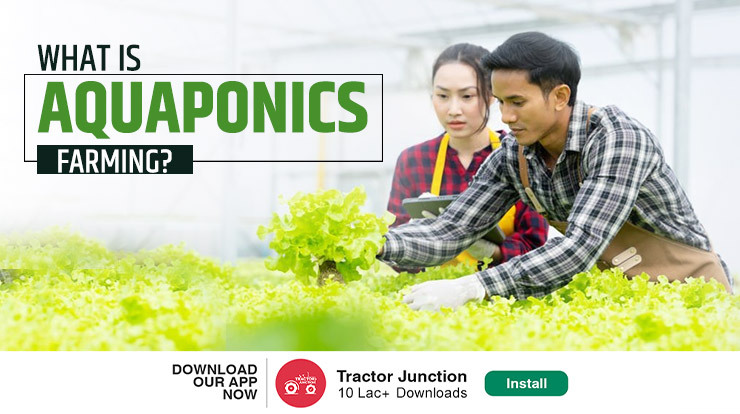
Organic farming aquaponics is a revolutionary method that combines aquaculture and hydroponics to create a sustainable and efficient farming system. In this approach, fish and plants are grown together in a symbiotic environment where fish waste provides essential nutrients for plant growth, while plants help filter and purify the water for the fish. This closed-loop system conserves water, as the same water is recirculated throughout the system, and eliminates the need for soil, reducing issues with soil-borne pests and diseases. By integrating these two components, organic farming aquaponics enhances resource efficiency and supports ecological balance, aligning with organic principles that emphasize natural processes and minimal synthetic inputs. This method not only boosts productivity but also contributes to environmental sustainability, making it a promising solution for modern agriculture.

Organic farming aquaponics is an advanced agricultural technique that merges aquaculture with hydroponics to create a highly efficient and sustainable farming system. By integrating fish cultivation with plant growth, organic farming aquaponics establishes a symbiotic relationship where fish waste provides essential nutrients for the plants, and the plants, in turn, help to filter and purify the water for the fish. This closed-loop system epitomizes the principles of organic farming, which emphasize the use of natural processes and the reduction of synthetic inputs, offering numerous benefits in terms of resource efficiency, productivity, and environmental sustainability.
One of the primary advantages of organic farming aquaponics is its ability to conserve water. Traditional soil-based agriculture often requires significant amounts of water for irrigation, leading to substantial water usage and potential wastage. In contrast, organic farming aquaponics uses a fraction of the water compared to conventional methods. The water in an aquaponics system is continuously recirculated, minimizing the need for external water sources and reducing overall consumption. This efficient water use is especially valuable in regions facing water scarcity or where water conservation is a priority. By utilizing a closed-loop system that recycles water, organic farming aquaponics significantly reduces the environmental footprint of farming operations.
In addition to water conservation, organic farming aquaponics supports soil-free cultivation, which aligns with the principles of organic agriculture. In this system, plants are grown in inert, soilless mediums such as gravel, expanded clay pellets, or other substrates that provide stability and allow for optimal nutrient uptake. This method eliminates the need for soil, which can harbor pests and diseases, thereby reducing the reliance on chemical treatments and maintaining the integrity of organic farming practices. The nutrients for the plants are derived from the waste produced by the fish, which is converted into usable forms by beneficial bacteria. This natural nutrient cycling enhances soil fertility and supports healthy plant growth without the need for synthetic fertilizers.
The integration of fish farming within organic farming aquaponics also contributes to increased productivity and profitability. The controlled environment of an aquaponics system allows for precise management of factors such as light, temperature, and nutrient levels, which can lead to accelerated plant growth and higher yields. Furthermore, the cultivation of fish provides an additional source of income, as fish can be harvested and sold alongside the plants. This dual-source of production enhances the economic viability of organic farming operations and offers farmers the opportunity to diversify their income streams.
Another key benefit of organic farming aquaponics is its promotion of biodiversity and ecological balance. The presence of both fish and plants in the system creates a diverse and dynamic ecosystem that supports beneficial microorganisms and natural processes. These microorganisms, including bacteria and fungi, play a crucial role in breaking down organic matter, cycling nutrients, and maintaining water quality. By fostering a balanced ecosystem, organic farming aquaponics reduces the need for external inputs and enhances the overall health and resilience of the farming system. This approach aligns with the principles of organic agriculture, which prioritize ecological stewardship and the maintenance of natural balances.
Implementing an organic farming aquaponics system requires careful planning and management to ensure its success. Key considerations include selecting appropriate fish and plant species that are compatible with each other and the system’s conditions. Maintaining water quality is essential, as factors such as pH, temperature, and nutrient levels must be monitored and adjusted to support both fish and plant health. Additionally, farmers must address the initial setup costs and ongoing maintenance needs, including system monitoring, fish care, and plant management. Despite these challenges, the benefits of organic farming aquaponics—such as water conservation, soil-free cultivation, and increased productivity—make it a compelling option for sustainable agriculture.
In summary, organic farming aquaponics represents a sophisticated and sustainable approach to agriculture that combines the principles of organic farming with the efficiency of aquaponics. By integrating fish and plant cultivation within a closed-loop system, this method conserves water, eliminates soil-borne pests, and supports high productivity while adhering to organic standards. As demand for sustainable and organic food solutions continues to grow, organic farming aquaponics offers an innovative and effective solution that enhances resource use, promotes ecological balance, and supports the future of agriculture. Through careful management and integration, this approach has the potential to transform farming practices and contribute to a more sustainable and resilient food system.









